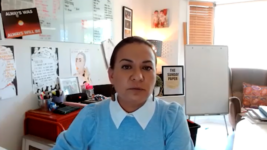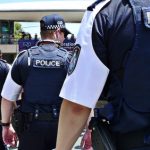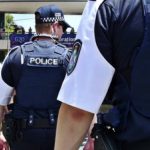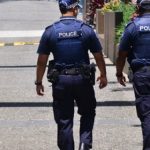Professor Launches Legal Proceedings Against Queensland Police

The Queensland Civil and Administrative Tribunal is currently deliberating upon a case brought by renowned author, academic and activist Professor Chelsea Watego against two Queensland police officers, accusing them of discrimination perpetrated during an arrest.
On arrival at a Brisbane nightclub in December 2018, the officers, who can’t be named because they’re police, walked straight up to the professor and arrested her within 18 seconds, despite security being focused on “an aggressive white male, who was behaving in a threatening manner”.
Watego, a Munanjahli and South Sea Islander woman, was waiting for an Uber out the front of the nightclub, which is why she hadn’t yet left the site of the venue after being asked to. And it was at this point that the white male patron had been racially abusive towards her.
Queensland police, however, had no qualms in directly approaching the First Nations woman, applying a wristlock along with cuffs, and arresting her on a charge of failure to leave a licenced premises, all whilst not bothering about the man that security saw as the real problem
The state of Queensland asserted in court that the arrest was “lawful, reasonable, proportionate and legally defensible”.
Yet, Watego’s version of events presents an all-too-common discriminatory approach taken towards First Nations people by Australian law enforcement, and this is increasingly so in regard to Aboriginal and Torres Strait Islander women.
Prejudicial enforcement
“A large part of the motivation for me pursuing action was the aggressive white male received no attention from the officers attending, despite what was observed in relation to his behaviour by the officers, security guards and the CCTV footage of events,” Professor Watego explained.
“That I would spend several hours in the watchhouse for such a trivial offence, and that critical footage from the watchhouse relating to my treatment was disposed of by the Queensland Police Service was what forced me to take action,” she continued.
The arresting officer told the tribunal that as the professor had taken a step toward the nightclub entrance, she had committed the offence of refusal to leave a licensed venue. However, that charge and another of obstructing police were ultimately dropped.
“I instead faced the charge of public nuisance relating to an argument between myself and the aggressive white male outside of the premises,” Watego told Sydney Criminal Lawyers. “I accepted a guilty plea in return for no conviction recorded, as so many of our mob do.”
And in having been compelled to take action, the professor underscored that she was “very fortunate” to have been supported by the National Justice Project, Dan O’Gorman SC and Joshua Creamer.
Fighting against racism
“In the case, we argued that the QPS officers’ actions in arresting me without a warrant were unnecessary and unlawful,” the professor said, pointing to section 365 of the Police Powers and Responsibilities Act 2000 (Qld), which lists a dozen reasons for conducting warrantless arrests.
The police claimed that the first reason, “to prevent the continuation or repetition of an offence or the commission of another offence”, was the justification for the arrest, “conceding that it did not meet any other of the eleven conditions”.
“Fortunately, I was able to draw attention to the 18 second interaction with the officers captured on CCTV and body-worn camera, which would reveal that argument to be flawed – at best – as it was clear that I was not seeking to re-enter the premises,” said Watego.
The Queensland University of Technology Indigenous Health professor added that one of the arresting officers had to amend his statement to the tribunal, conceding he had applied a wristlock in addition to handcuffing her.
“It is now in the hands of the tribunal to ‘infer’ whether this treatment was as a result of my race, however in this process, I feel validated that the treatment I received was wrong, irrespective of whether race can be seen in the commission of it,” Watego made clear.
And she further set out that the process has revealed to her the limitations of race discrimination laws in redressing racial violence encounter by First Nations people, even when there’s clear evidence.
So, while fighting racism should continue, she maintained, “other means for redress” need to be explored.
Nothing prepares
Not only is Watego an academic and the author of recently published Another Day in the Colony, a work exposing ongoing colonial violence, but she’s also a prominent activist, who regularly campaigns against the sort of racial bias that she was subjected to out the front of the nightclub.
In response to a suggestion that her work in this space might have left her with an enhanced ability to cope with the sort of prejudice that came her way one night in December 2018, she replied, “I don’t know I was better prepared to deal with it.”
“Knowing how race works as a structure of power can do all kinds of harms psychologically, because it is in knowing how it works that you come to know how hard it is then to effect any substantial change.”
Indeed, Watego found that despite being ready to defend others subjected to racial discrimination, it actually took time to decide that she should take up her own cause. And this process has taught her more about how race works, and those who sustain it, than any texts she’s ever read.
“Irrespective of how we might be cast in these fights, it is necessary that we continue to fight because we are worthy of fighting for,” Professor Watego said in conclusion.
“Blackfullas have been most courageous in fighting racism every day and everywhere in this place. What’s needed now is a legal fraternity that’s prepared to be as courageous as us, in taking on these fights in the courts.”







